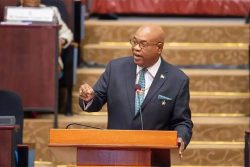The Commission of Inquiry (CoI) into the Education System has recommended an investigation be conducted into the National School Feeding Programme with a view to having it provide more value for money.
Speaking at the handing over of the preliminary report on Friday, CoI Chairman Ed Caesar said the school feeding programme garnered a lot of attention during presentations made to the Commission; very little of this attention was positive.
“We have gone to many places and heard, ‘we want the school feeding programme but we don’t like the juice’ and the parents are telling the children not to collect the biscuits,” Caesar related.
He explained that teachers have asked for another type of juice stating that several flavours, especially the mango, have proven to be problematic.
According to Caesar, teachers and parents are requesting a breakfast programme with more variety.
“Give us sandwiches sometimes. Give us milk sometimes, a different shape of biscuit or a different flavour and a different type of juice,” he reported teachers as saying before asking for an investigation into the school feeding.
“We are not getting value for money. Everywhere we went there were complaints about this programme,” Caesar stressed.
The National School Feeding Programme, which was re-launched in 2010 provides students in the nursery and early primary with biscuits and juice. The programme allows for each child to receive one box of juice along with seven biscuits, as a mid-morning snack. In 2010, the ministry had boasted that both snack items were made locally with Demerara Distillers Limited (DDL) supplying the juices and Banks DIH Limited the biscuits.
However the awarding of the contract for the supply of juice for this programme has recently been the subject of some controversy after Rudisa subsidiary Caribbean Inter-national Distributors Inc (CIDI) won the contract.
This award prompted a protest by DDL subsidiary Topco, which had bid a lower price and had previously held the contract.
Four bids were submitted on May 24 last year, when the National Procurement and Tender Administration Board (NPTAB) opened tenders. DDL’s bid was $436.8 million without VAT or $506.6 million with VAT while CIDI’s bid was $545.2 million.
DDL had written to the government after losing the contract for the first time since the former PPP/C government replaced milk with juices back in 2010.
In response, government had said that a recommendation was made by NPTAB to have the contract awarded to the third highest bidder (Rudisa) as it had satisfied all the technical and administrative requirements. Cabinet subsequently offered its no objection and the contract was awarded accordingly. It further noted that Cabinet was advised that the lowest bidder (DDL) was not recommended for the contract in view of continued issues with past performance dating back to 2012.
DDL subsequently made a formal protest to the Bid Protest Committee (BPC) which ruled in its favour.
However, the BPC did not pronounce on DDL/Topco’s request to order the ministry to evaluate or re-evaluate the company’s bid based on the criteria specified in the tender documents. As a result, CIDI still has the contract.








